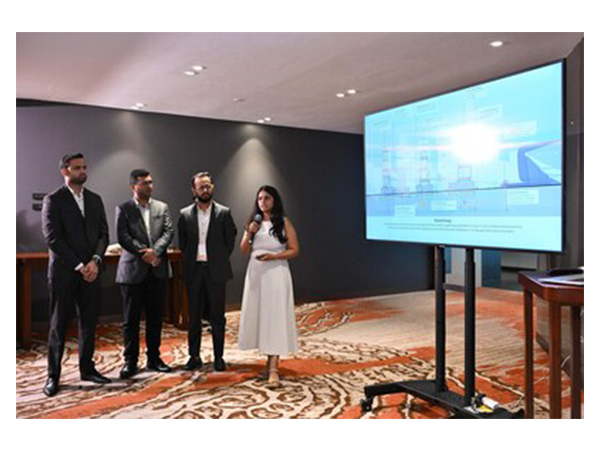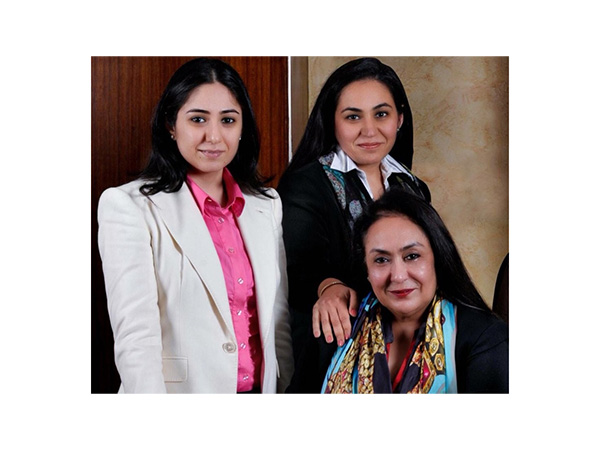CEPT University Students Bring India Its First Victory at ULI Hines Student Asia Pacific Competition
May 29, 2025

PRNewswire
Ahmedabad (Gujarat) [India], May 29: In a landmark achievement, a team of five students from CEPT University have clinched first place in the 2025 ULI Hines Student Competition - Asia Pacific, placing CEPT on the global map as the first Indian institution to win this internationally renowned competition in its 23-year history. The winners were announced today at the ULI Asia Pacific Summit in Hong Kong, where the CEPT team presented their visionary proposal before an audience of global industry leaders, academics, and peers.
This year's competition saw participation from 33 multidisciplinary teams across 10 countries and territories in the Asia Pacific region. Finalist teams included CEPT University (India), The University of Melbourne (Australia), and Chulalongkorn University (Thailand). CEPT University had first entered the competition in 2024 and secured the first runner-up position.
Representing India as the Zoning Out Crew, the winning team included Danish Sikkander, Pooja Save, Pranav Amarnath, and Rishi Kumar from the Master's in Urban Design, and Sriram Soni from the Master's in Urban Infrastructure program. The team worked under the mentorship of Purvi Chhadva, Program Chair of the Master's in Urban Design, and Dr. Mona Iyer, faculty member at Faculty of Planning, CEPT University.
As part of their prize, the team will receive ULI memberships, travel and accommodation support, and the opportunity to engage with leading global professionals in real estate, planning, and urban innovation.
The proposal 'Kai Tak 2050: The Active Shared City' submitted by CEPT University students reimagined the Kai Tak Waterfront in Hong Kong as a next-generation 'sharing city'--a vibrant urban model where density, integrated infrastructure, and community-driven design foster innovation, sustainability, and inclusive growth. The concept was anchored in five core pillars: shared mobility, green spaces, living, culture, and resources. The team proposed an urban future where sharing is not a compromise but a means to elevate quality of life. By treating density as an advantage, encouraging social interaction and active living, and fostering economic self-sufficiency, the proposal positions Kai Tak as a potential global benchmark for future high-density, livable, and resilient cities.
The proposal featured a car-free, multi-level transit system, climate-resilient parks and rooftop farms, co-living and innovation hubs, a cultural corridor for learning and creativity, and a zero-carbon district powered by renewable energy and circular systems. Together, these components formed a forward-looking, inclusive urban blueprint. The jury praised the submission for its originality, financial feasibility, and community-first approach--recognizing it as a scalable and future-forward model for equitable and sustainable urban development.
CEPT student Rishi Kumar, who led the Zoning Out Crew, said, "Leading the team in the ULI Hines Competition was an incredible experience of collaboration and growth. Each member deepened their skills--from strategy and storytelling to visualization and practical implementation--allowing us to craft a thoughtful, well-rounded design. Together, we embraced diverse perspectives and sharpened our ability to design beyond conventional boundaries."
Reflecting on the significance of this achievement, Prof. Shalini Sinha, Dean, Faculty of Planning at CEPT University, emphasized the global relevance of the students' approach and the academic ethos that shaped it. "This award is not just a celebration of design excellence but a testament to our curriculum that encourages critical thinking, collaboration, and socially responsive urban solutions. It reinforces our belief that thoughtful planning, when backed by rigorous analysis and innovation, can drive transformative change," she said.
Praising the team's exemplary performance and the global recognition the students have won, Prof Barjor Mehta, President of CEPT University, said, "This win is a proud moment. Our students have demonstrated that bold, people-centric ideas--when grounded in feasibility--can shape global conversations on the future of cities. This achievement is a milestone and a reflection of our growing role in shaping global urban futures."
Organised by the Urban Land Institute (ULI) in partnership with Hines, the ULI Hines Student Competition - Asia Pacific is regarded as the region's most prestigious urban ideas challenge. It invites final-year undergraduate and graduate students to form interdisciplinary teams and respond to real-world urban development scenarios with innovative, sustainable, and financially viable proposals. Teams are given three weeks to deliver a comprehensive vision--covering planning, design, and financial analysis--for a real site in a major Asia Pacific city.
The winning proposal can be accessed online. To view the narrative summary, click: https://asia.uli.org/wp-content/uploads/2025/04/3_8224_The-Active-Shared-City_NarrativeSummary.pdf 
About CEPT University
CEPT University is a recognized leader in education and research in the areas of architecture, planning, design, technology and urban management. Its teaching programs aim to build thoughtful professionals and its research programs deepen understanding in its areas of expertise. CEPT University also undertakes advisory projects to support the national, state and city governments and large sections of private industry. Through its education, research and advisory activities, the University strives to contribute to enriching the lives of people in India's villages, towns and cities.
The University comprises five faculties: viz. the Faculty of Architecture, the Faculty of Planning, the Faculty of Technology, the Faculty of Design, and the Faculty of Management. In December 2023, CEPT University was recognized by the Government of India as a Centre of Excellence in Urban Planning and Design. This comes with an endowment of Rs. 250 Crore to be used towards the research and training on India specific knowledge in Urban Planning and Design over the next 25 years.
CEPT University was established by the CEPT University Act of 2005 enacted by the government of Gujarat. It was originally started in 1962 as the School of Architecture supported by the Ahmedabad Education Society. The Department of Scientific and Industrial Research (DSIR) of the Government of India recognizes the University as a Scientific and Industrial Research Organization (SIRO). CEPT University is recognized as a Center of Excellence by the Government of Gujarat. CEPT University has over 30 ongoing collaborations and exchange programs with top-ranked universities across the world.
Photo: https://mma.prnewswire.com/media/2697904/Zoning_Out_Crew_Presents_Proposal.jpg
Logo: https://mma.prnewswire.com/media/2323005/CEPT_University_Logo.jpg
(ADVERTORIAL DISCLAIMER: The above press release has been provided by PRNewswire. ANI will not be responsible in any way for the content of the same)









